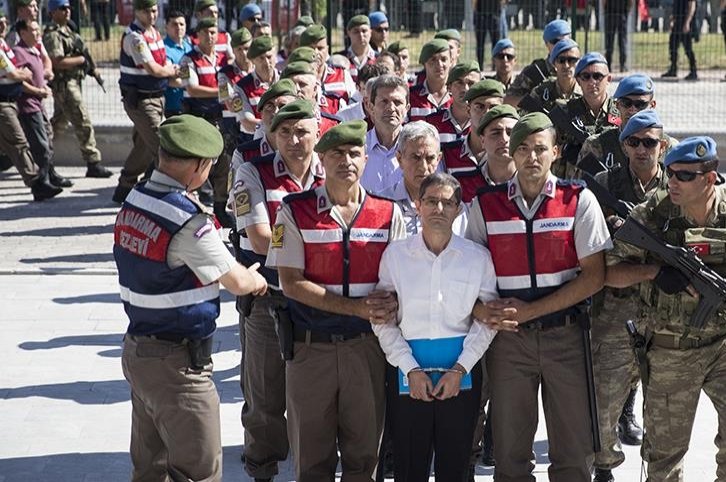
Two years after they were handed down harsh sentences for their involvement in a 2016 coup attempt, military officers and civilians saw their sentences upheld by an appeals court on Friday. A regional court in the capital Ankara paved the way for a final appeal to the Supreme Court of Appeals, or Yargıtay, for dozens of defendants in the case with its decision.
Ankara Regional Court, the penultimate appeal authority, issued sentences and acquittals for defendants in line with existing laws. The defendants were among the 475 put on trial for their putschist actions at Akıncı military base in the capital on July 15, 2016, when military officers and others linked to the Gülenist Terror Group (FETÖ) tried to seize power.
It was one of the biggest trials over the coup attempt that killed 251 people and injured nearly 2,200 others. The trial had also shed a broader light on the role of civilians in the putsch bid, including executives of companies associated with the terrorist group.
On Nov. 26, 2020, the Fourth High Criminal Court in the capital Ankara handed down 79 counts of aggravated life imprisonment and an additional prison term of 3,901 years in total to 15 military officers and four civilians in the trial. Another 291 defendants were sentenced to aggravated life imprisonment while 70 others were acquitted. Forty-six others were sentenced to life while other defendants in the case were handed lighter prison terms on charges of membership in a terrorist group.
The appeals court said in its verdict that the sentences were appropriate based on the applied legal process, which reached the conclusion that the defendants were guilty of crimes they were accused of.
The Akıncı trial has been one of the largest and longest trials dealing with the coup attempt. Some 515 hearings were held, with 385 eyewitnesses and 440 plaintiffs' testimonies heard throughout the trial. Prosecutors had prepared a 4,658-page indictment for the trial against the defendants who held almost every rank in the military, from generals and lieutenants to noncommissioned officers. They had asked for 79 instances of aggravated life imprisonment for civilian defendants in the case and 16 military officers. They also asked for additional prison terms for those 16 officers. The prosecutors had requested one instance of aggravated life imprisonment for 355 defendants, acquittal of 71 defendants and lesser prison terms for the remaining defendants. Despite clear evidence, most defendants denied the accusations. Civilian defendants claimed they were at the Akıncı base "by coincidence" while military officers claimed they did not take part in the attempt despite being caught red-handed on security camera footage at the base. Some claimed they thought they were taking part in a counterterrorism operation.
The coup attempt was a rare instance of people without military backgrounds organizing military officers to overthrow the government, unlike previous coups in the country which were almost exclusively planned and carried out by military officers. Adil Öksüz is viewed as the "civilian" leader of the coup attempt. The former theology lecturer, captured in Akıncı when the coup attempt was quelled, disappeared after a court controversially released him shortly after the attempt. Gen. Akın Öztürk, former head of the Turkish Air Forces, was accused of being the military leader of the attempt. Öztürk, who was in Akıncı for what he called a random visit, was sentenced to multiple instances of aggravated lifetime imprisonment in another trial on the coup attempt.
Since the coup attempt, the Turkish judiciary has managed to wrap up 289 trials against the putschists, sentencing 4,891 defendants. The lengthy appeals process has also concluded, with most trials seeking to overturn verdicts still playing out before higher courts. Determined to deliver swift justice, Turkey has set up new courts and massive prison complexes that also include spacious courtrooms. In the aftermath of the putsch bid, prosecutors’ offices across the country launched more than 100,000 investigations into coup-related crimes.
